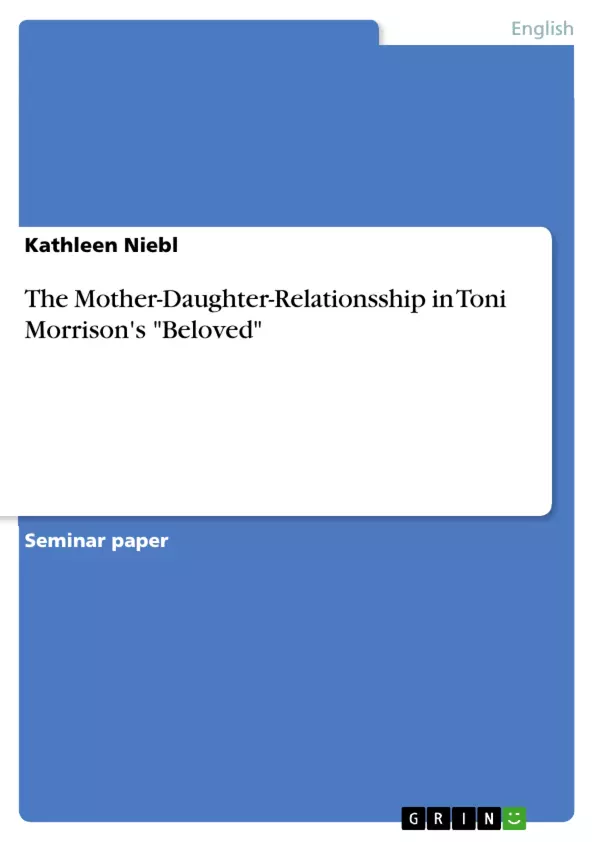In the course of the twentieth century, the perception of motherhood, both as a cultural concept and a literary theme, has been subjected to considerable changes. Due particularly to psychoanalytical discoveries emphasising the formative influence of early childhood upon the mental growth and health of the individual, the nineteenth-century notion of motherhood as solely based on devotion, self-sacrifice and restriction to the domestic sphere was further strengthened during the first half of the twentieth century (Würzbach 370-374). What was for a long time assumed the natural and consequently most satisfying task for a woman, has increasingly been called into question under the influence of the feminist movement after 1968. Influential and frequently quoted studies like Adrienne Rich’s Of Woman Born (1977) or Marianne Hirsch’s The Mother/Daughter Plot (1989) reveal how the perception of motherhood, commonly interpreted as a mere cultural reality construct, has been shaped and altered in accordance with the changing needs of a patriarchal society, and its questionable ideas of economic progress and sociological as well as cultural advancement (Krimphove 11-68).
Although these theories have proven substantial and inspiring for not only female authors, the universal validity of the assumptions made by these predominantly white, Anglo-Saxon feminists has been challenged by women belonging to ethnic minorities. Accompanied by the questioning of the premises and possibilities of the literary canon, doubts also arouse whether the specific experiences and the unarguably incomparable historical backgrounds of previously marginalized groups of women are compatible to eurocentric “white” feminist theories, especially those that deal with psychoanalytical concerns (Krimphove 11-68).
Inhaltsverzeichnis (Table of Contents)
- Changes in the Perception of Motherhood during the Twentieth Century
- The Mother-Daughter-Relationship in Toni Morrison's Beloved
- The Motives for the Telling
- Maternal Love in Beloved
- Sethe's Childhood and Socialisation
- Sethe's Escape from Sweet Home
- The Hierarchy of Motherhood and Selfhood
- Who is Beloved?
- Sethe and Denver
- Sethe and Beloved
- Beloved's Exorcism from 124
- Conclusion
Zielsetzung und Themenschwerpunkte (Objectives and Key Themes)
This paper examines the mother-daughter relationship in Toni Morrison's novel *Beloved*, focusing on how Morrison challenges traditional views on motherhood and explores the complexities of black female identity in the aftermath of slavery. The paper aims to understand how the narrative portrays the unique experiences of black mothers, particularly Sethe, and the profound impact of slavery on their ability to nurture and protect their children.
- The impact of slavery on black motherhood and the struggle for self-determination.
- The complexities of maternal love and the tension between protection and liberation.
- The role of memory and storytelling in healing from historical trauma.
- The intersection of race, gender, and motherhood in shaping black female identity.
Zusammenfassung der Kapitel (Chapter Summaries)
The paper begins by analyzing the evolution of the concept of motherhood in the 20th century, tracing the shift from a traditional, idealized view to a more nuanced understanding informed by feminist and psychoanalytic theories. The paper then delves into the unique challenges faced by black mothers in the United States, exploring the impact of racial oppression and the stereotypes surrounding black female identity.
The next section examines the motives behind Toni Morrison's writing of *Beloved*. The paper highlights Morrison's desire to expose the truth about the lives of enslaved people, particularly the experiences of black women. The paper emphasizes Morrison's focus on the interior lives of individuals, beyond the limitations of historical records, and the role of imagination in understanding and reconstructing the past.
The final section delves into the complex mother-daughter relationship in *Beloved*, focusing on the bond between Sethe and Beloved. The paper explores the significance of Sethe's decision to kill her own child to protect her from slavery, and the repercussions of this act on her life. It also examines the impact of Beloved's return on Sethe and Denver, and the struggle for healing and reconciliation within the family.
Schlüsselwörter (Keywords)
This preview focuses on themes of motherhood, slavery, black female identity, trauma, memory, and storytelling. It explores the intersection of race, gender, and history, and examines how these factors shape the lived experiences of black mothers in the United States. The paper also draws on concepts of feminist theory, psychoanalytic theory, and the power of imagination in understanding the past.
Frequently Asked Questions
How does Toni Morrison portray motherhood in "Beloved"?
Morrison portrays motherhood as a complex struggle under the shadow of slavery, where the act of nurturing is constantly threatened by the lack of autonomy and the trauma of the past.
What is the significance of Sethe's choice?
Sethe's decision to kill her own daughter to save her from a return to slavery is the central trauma of the novel, exploring the extreme measures a mother might take to protect her child's spirit from dehumanization.
Who is the character "Beloved"?
Beloved is widely interpreted as the ghost or reincarnation of the daughter Sethe killed, representing the physical manifestation of repressed memory and historical trauma.
How does slavery affect the mother-daughter bond?
Slavery treats humans as property, denying mothers the right to claim their children. This creates a "hierarchy of motherhood" where selfhood and the ability to love are distorted by the constant fear of separation.
What role does memory play in the novel?
Memory, or "rememory" as Sethe calls it, is a powerful and often painful force. The novel explores how individuals and communities must confront these memories to achieve healing and exorcise the ghosts of the past.
- Quote paper
- Kathleen Niebl (Author), 2004, The Mother-Daughter-Relationsship in Toni Morrison's "Beloved", Munich, GRIN Verlag, https://www.grin.com/document/27321



